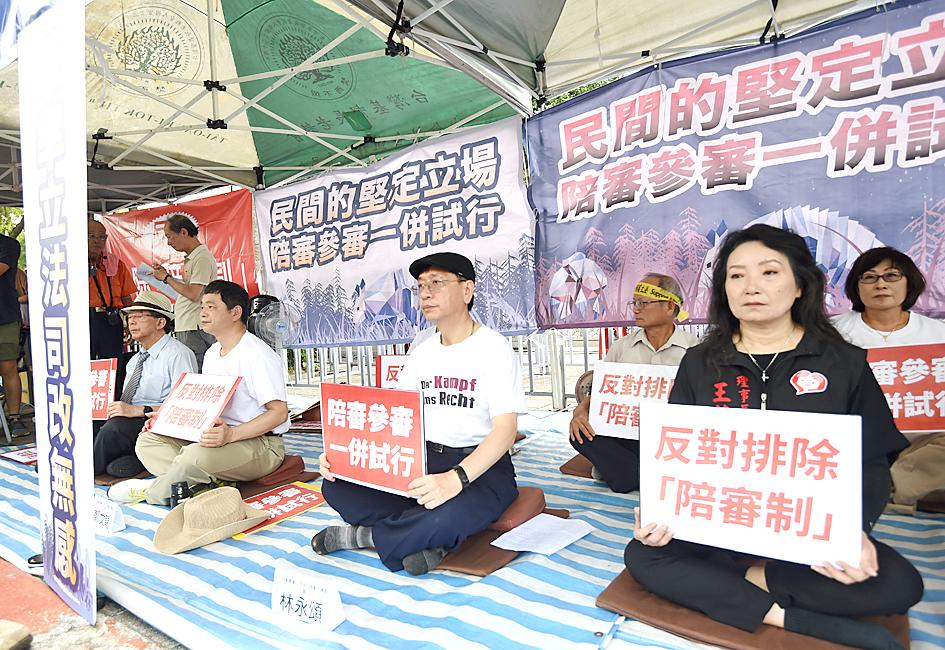Judicial reform advocates yesterday protested the legislature’s exclusion from its extraordinary session agenda of a bill to implement a jury system, while including a rival proposal for a lay judge system.
Members of the Judicial Reform Foundation and the Taiwan Jury Association were among the protesters outside the Legislative Yuan in Taipei demanding a “twin track” solution, in which the government would test both systems for two to three years to determine which works best and garners the most public support.
“To have a jury system is to truly respect the wishes of the people in a democracy. Our government, in a push to include citizen participation in criminal prosecutions, should not reject a jury system to focus only on a lay judge system, which is favored by judges,” foundation chairman Lin Yung-sung (林永頌) said.

Photo: Chien Jung-fong, Taipei Times
“In doing so, the government and judiciary are depriving the citizens of their right to choose a jury system,” Lin added.
The Judicial Yuan’s bill for a lay judge system proposes three judges and six lay judges jointly presiding over criminal trials where defendants face more than 10 years in prison if convicted or are accused of intentional homicide.
Association founder Jerry Cheng (鄭文龍) said that professional judges would retain real authority and decisionmaking power under the system, calling the bill “fake judicial reform.”
The jury system is the mainstream judicial trial system in 52 nations, including the US and the UK, he said.
“It prevents miscarriages of justice, cuts down on corrupt judges taking bribes and curtails political interference in rulings,” Cheng said.
New Power Party caucus whip Chiu Hsien-chih (邱顯智) also attended the protest in support of a jury system.
“Granting citizens the right to participate in trials has been at the core of the judicial reform movement in the past two decades. However, the proposed bill as presented by the Judicial Yuan excludes the jury system,” he said.
“Is it because the Judicial Yuan does not want citizens to be involved in rulings? We do not want justice system officials to hijack our nation. It is wrong,” Chiu said.
Taiwan People’s Party caucus whip Lai Hsiang-ling (賴香伶) also endorsed the twin track solution.
“Judicial reform should not be political or a confrontation between ideologies. This issue should go to the public for discussion and to solicit opinions,” she said.
“Citizen participation in rulings is an important step in the judicial reform movement, so we believe the legislature should not deliberate on this bill at the extraordinary session. It should take it up during the regular legislative session,” she added.
Lin said that groups would hold sit-in protests and other actions throughout the extraordinary session, which is to end on July 22.
On Friday and Saturday, they are to hold evening rallies on a street next to the Legislative Yuan, and on Sunday, they are to march to the Presidential Office Building, Lin added.

A magnitude 4.9 earthquake struck off Tainan at 11:47am today, the Central Weather Administration (CWA) said. The hypocenter was 32.3km northeast of Tainan City Hall at a depth of 7.3km, CWA data showed. The intensity of the quake, which gauges the actual effect of a seismic event, measured 4 in Tainan and Chiayi County on Taiwan's seven-tier intensity scale, the data showed. The quake had an intensity of 3 in Chiayi City and County, and Yunlin County, while it was measured as 2 in Kaohsiung, Nantou County, Changhua County, Taitung County and offshore Penghu County, the data showed. There were no immediate reports of

‘DENIAL DEFENSE’: The US would increase its military presence with uncrewed ships, and submarines, while boosting defense in the Indo-Pacific, a Pete Hegseth memo said The US is reorienting its military strategy to focus primarily on deterring a potential Chinese invasion of Taiwan, a memo signed by US Secretary of Defense Pete Hegseth showed. The memo also called on Taiwan to increase its defense spending. The document, known as the “Interim National Defense Strategic Guidance,” was distributed this month and detailed the national defense plans of US President Donald Trump’s administration, an article in the Washington Post said on Saturday. It outlines how the US can prepare for a potential war with China and defend itself from threats in the “near abroad,” including Greenland and the Panama

The Chinese Nationalist Party (KMT) is maintaining close ties with Beijing, the Democratic Progressive Party (DPP) said yesterday, hours after a new round of Chinese military drills in the Taiwan Strait began. Political parties in a democracy have a responsibility to be loyal to the nation and defend its sovereignty, DPP spokesman Justin Wu (吳崢) told a news conference in Taipei. His comments came hours after Beijing announced via Chinese state media that the Chinese People’s Liberation Army’s Eastern Theater Command was holding large-scale drills simulating a multi-pronged attack on Taiwan. Contrary to the KMT’s claims that it is staunchly anti-communist, KMT Deputy

RESPONSE: The government would investigate incidents of Taiwanese entertainers in China promoting CCP propaganda online in contravention of the law, the source said Taiwanese entertainers living in China who are found to have contravened cross-strait regulations or collaborated with the Chinese Communist Party (CCP) could be subject to fines, a source said on Sunday. Several Taiwanese entertainers have posted on the social media platform Sina Weibo saying that Taiwan “must be returned” to China, and sharing news articles from Chinese state media. In response, the Mainland Affairs Council (MAC) has asked the Ministry of Culture to investigate whether the entertainers had contravened any laws, and asked for them to be questioned upon their return to Taiwan, an official familiar with the matter said. To curb repeated